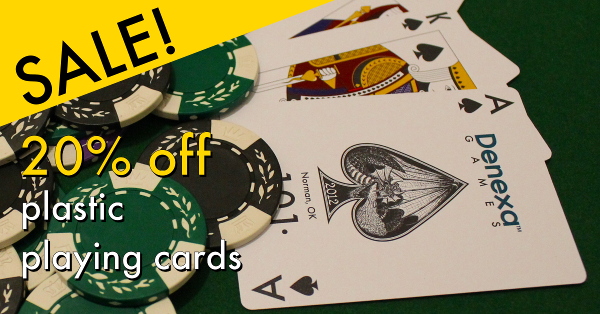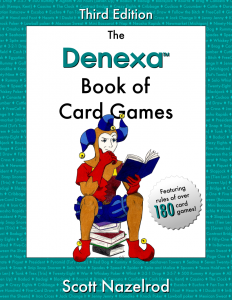Dou Dizhu
Dou Dizhu (斗地主), which roughly translates into English as Fight the Landlord, is a Chinese climbing game for three players. In Dou Dizhu, one player takes on the role of “landlord”, fighting to be the first to run out of cards. The other two players team up to try to dispense with their cards before the landlord does!
Dou Dizhu is a fascinating example of a climbing game because of the great flexibility the game affords players in choosing combinations of cards. This allows players to form complex strategies in planning their next moves. Because of this, the game is said to be easy to learn but hard to master.
Object of Dou Dizhu
The object of Dou Dizhu is to be the first player to run out of cards. (If playing with a partner, your partner being the first out is just fine too.)
Setup
To play Dou Dizhu, you need a standard 52-card deck of playing cards, with two jokers that are different from each other somehow. Happily, Denexa 100% Plastic Playing Cards fit the bill wonderfully. One joker should be designated as the higher joker. (On Denexa cards, we recommend this to be the red joker, the one with the dragon.) You’ll also need some way of keeping score. A hard-score method, using counters like poker chips, works the best, but you can also keep score with pencil and paper or similar.
Shuffle the deck. Take the top card and flip it face-up, randomly inserting it somewhere into the middle of the deck. Each player in turn draws a card from the deck until each have seventeen cards in their hand. Note which player takes the face-up card. The remaining three cards become a widow and are left face-down in the center of the table.
Card ranking
As with many Asian climbing games, the cards rank in their usual order, with aces high, but with the 2 ranked even higher than that. The jokers rank even higher than the 2, with one joker (the red joker) outranking the other (the black joker). Thus, the full rank of cards is (high) ★, ★, 2, A, K, Q, J, 10, 9, 8, 7, 6, 5, 4, 3 (low). Suits are not relevant to game play.
Game play
The auction
The player who drew the face-up card in the deck bids first in the auction. They can choose to bid one, two, or three, or pass. The next player to their left then bids, and must bid higher than the first player or pass. A player can make a bid after initially passing. Bidding continues until either there are two consecutive passes or someone bids three. Once a winner has been established, they become the landlord. The landlord takes the widow into their hand, giving them a 20-card hand.
Combinations
Play of the hand in Dou Dizhu revolves around different combinations of cards. The valid combinations in Dou Dizhu are:
- Single card
- Pairs
- Trips (three of a kind)
- Straights (five or more cards in sequence, e.g. 3-4-5-6-7)
- Quads (four of a kind)—but see restriction below
- Consecutive pairs (three or more pairs in sequence, e.g. 3-3-4-4-5-5)
- Consecutive trips (two or more trips in sequence, e.g. 3-3-3-4-4-4)
There are some restrictions on when the high-ranking 2s and jokers can be used. They can appear as single cards, or in pairs or trips. They cannot be used in straights or consecutive pairs or trips.
In addition, extra cards called kickers may also be attached to trips and consecutive trips. A kicker can be either a single card or a pair. For example, 7-7-7-5 and 7-7-7-5-5 are both valid combinations. When attaching kickers to consecutive trips, there must be one kicker or kicker pair for each triplet, each of which must be a different rank. For instance, 3-3-3-4-4-4-9-J and 4-4-4-8-8-8-7-7-Q-Q are both valid, but 3-3-3-4-4-4-9-9 is not (as this is one pair kicker for two triplets, not one single card for each triplet). Both 2s and jokers can be used as kickers, but not both jokers at the same time.
Quads must always be played with kickers to be used as a regular play. This can take the form of two single cards (5-5-5-5-8-K) or two pairs (5-5-5-5-8-8-K-K). Quads played without kickers are a special combination called a bomb (described below in “Bombs and rockets”).
Play of the hand
The landlord plays first. They may play any combination of cards they wish. The next player to the left then must play a higher-ranking instance of the same combination. To be considered the same combination, the same number of cards must be played: straights must be of the same length, consecutive pairs must have the same number of pairs, the same number of kickers must be played, etc. Combinations are ranked by the highest card present, with any kickers disregarded. For example, 7-7-7-5 is higher than 4-4-4-A (because the ace is a kicker and is thus not counted toward the rank of the combination). If a player cannot or does not want to play higher, they may pass.
This continues, with play continuing around the table, each player playing higher and higher combinations. Players may jump back into game play, even after passing, on their next turn. After two consecutive players have passed, the remaining player is free to play whatever combination of cards they choose (i.e. they are not compelled to play the same type of combination as before). As before, play continues to to the left, with the next player following up on the most recently played combination with a higher one of the same type.
Bombs and rockets
There are two special combinations in the game. These are the bomb, four of a kind with no kickers, and the rocket, which is a pair of jokers. Bombs and rockets may be played at any time, regardless of the combination being played. A bomb can only be beaten by a higher-ranked bomb or a rocket, and a rocket is unbeatable.
Ending the hand
Game play continues until one player runs out of cards. If that player is the landlord, each of their opponents pays them the amount bid (one, two, or three chips). If the landlord did not go out, the landlord must pay each opponent the amount bid. The payout is doubled for each time a bomb or rocket was played over the course of the hand.


